Taloustutkimus: Majority of Wolt couriers wish to continue as contractors
Wolt believes couriers should not be forced into employment but stresses that the current situation still calls for improvements. Improving the safety nets of the self-employed or renewing the current labour law are good alternative ways forward.

Wolt courier Dario Magdić delivering in Torkkelinmäki, Helsinki.
Last October, a majority of the Labor Council issued a statement in which they concluded the relationship between Wolt and couriers to be employment. A minority of the Labour Council disagreed and insisted that the couriers should be seen as contractors.
We have been looking into the matter from different perspectives ever since. As our most important action, we decided to ask an independent research company to find out what the couriers thought about the matter – also because the Labour Council did not hear out the couriers.
Taloustutkimus’ survey: Majority of the couriers prefer being a contractor
Taloustutkimus conducted the survey between April 7 and 15. This was the first time in Finland that an independent research company asked the couriers what they thought about the topic. The study touched on several aspects, such as how many of the couriers would prefer to work as contractors and how many in an employment relationship, whether couriers feel they are forced to work as contractors, do the couriers live off the social welfare system, if the courier earnings are enough to make a living, and so forth.
To be able to do the survey, Taloustutkimus got the contact information of all 3,674 couriers who had a valid contract with Wolt, who had made at least one Wolt delivery during 2021, and who did not prohibit sharing their contact information.
Taloustutkimus stressed to all the respondents that the survey was confidential and anonymous and that it was possible to participate in English and Finnish. A total of 1,539 couriers took part, making the response rate 42%.
Below you’ll find some excerpts from the results. (Juho Rahkonen, who was responsible for the research at Taloustutkimus, juho.rahkonen@taloustutkimus.fi, has also promised to answer possible media questions about the results.)
Background information: Three out of five couriers have a higher education degree, 67% are satisfied and 11% unsatisfied with their income
Taloustutkimus asked the respondents how satisfied they are with working with Wolt, their earnings, and the work in general. The answers on a scale of 1 to 5 look like this:
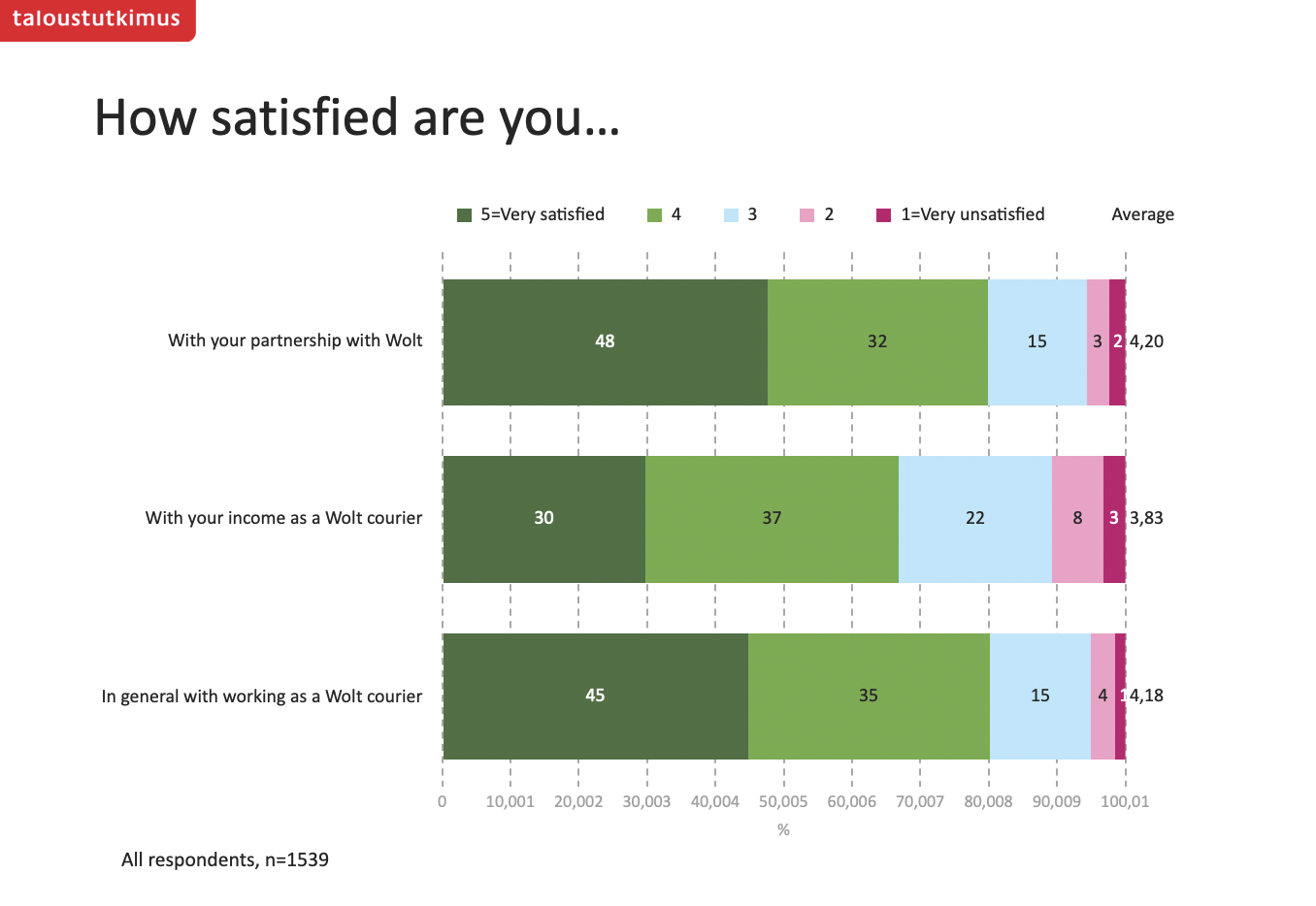
For example, 67% of the respondents were satisfied with their earnings whereas 11% were dissatisfied. For context: In June, an average courier invoiced Wolt for 15,69 € before VAT for every online hour. An online hour includes all the time that the courier is ready to accept or decline orders.
The background information also sheds light on the respondents’ level of education:
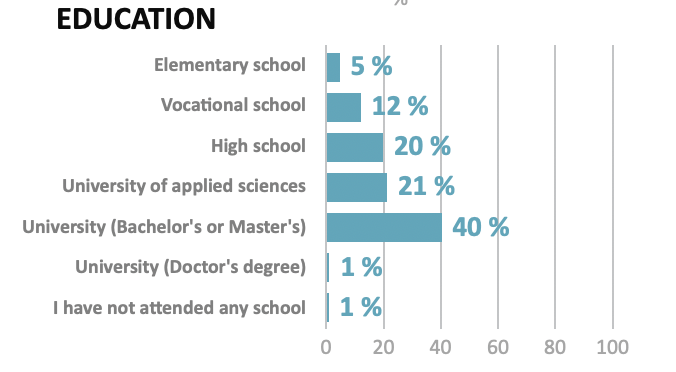
62% of the respondents have a higher education degree, i.e. a degree from a university or a university of applied sciences. This may be partly explained by the fact that a significant part of the couriers do not necessarily speak Finnish, which can make it difficult even for a highly educated person to find a job that matches their education.
25% of the couriers chose employment – 73% prefer entrepreneurial freedom over employment-related safety
From the societal point of view, the most interesting question in the survey was whether a person would prefer to work as a Wolt courier in an employment relationship or as a contractor. The question set out to get the spontaneous opinion of the couriers. It was also possible to choose “It doesn’t matter to me” or “I’m not sure”. The score:
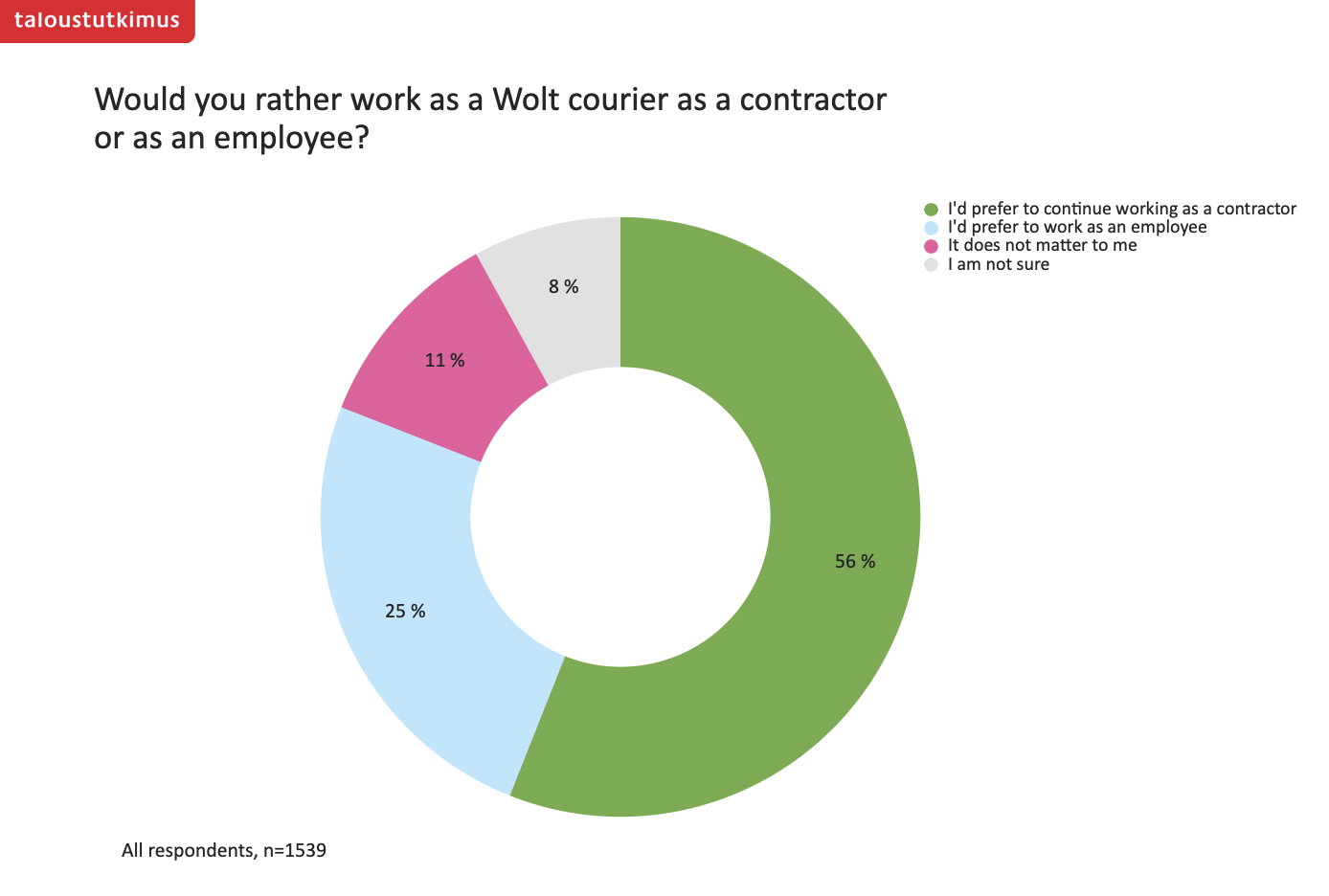
The majority of the couriers said they’d prefer to continue as a contractor, whereas 25% said they’d go for employment. For 11%, the questions didn’t matter, and 8% were unsure.
(After this, the couriers were described how employment and being a contractor differ from each other in terms of safety nets, responsibilities and freedom, and asked the same question again without giving the possibility to change the original answer. The number of people that preferred being a contractor rose to 68% and people that preferred employment dropped to 20%. However, as it’s nearly impossible to describe the differences objectively, we consider the numbers visible in the graph to be the primary result, and the latter more of an interesting detail.)
Couriers were also presented with several claims –– below you’ll find some examples.
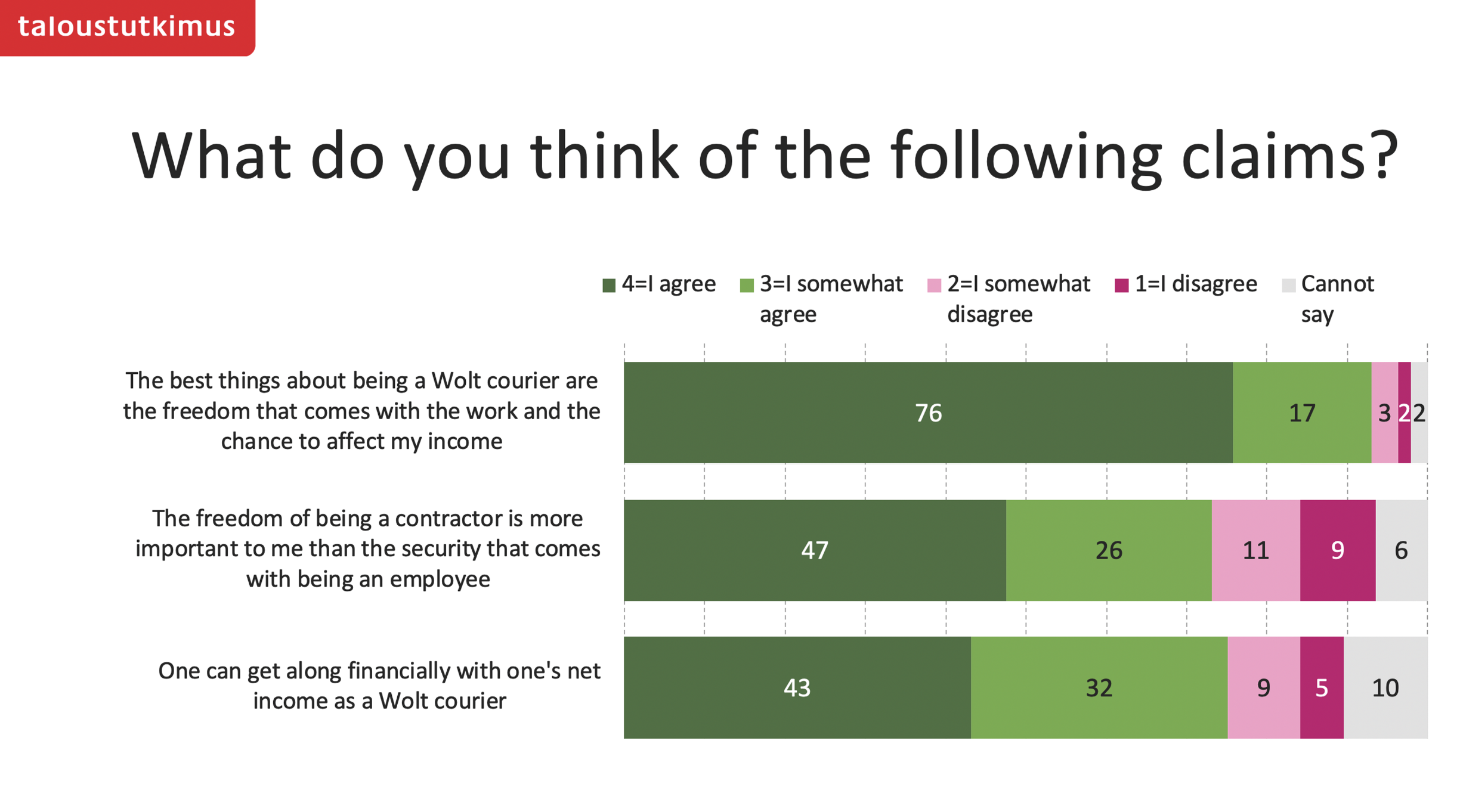
In the above graph, 73% agree with the claim “freedom of being a contractor is more important to me than the security that comes with being an employee”, whereas 20% disagreed with it.
For 81%, being a Wolt courier is their “own choice” – 2% get income support
When the respondents were asked whether it was their own choice to work as a courier or if it was because they were unable to find other work, the results looked like this:
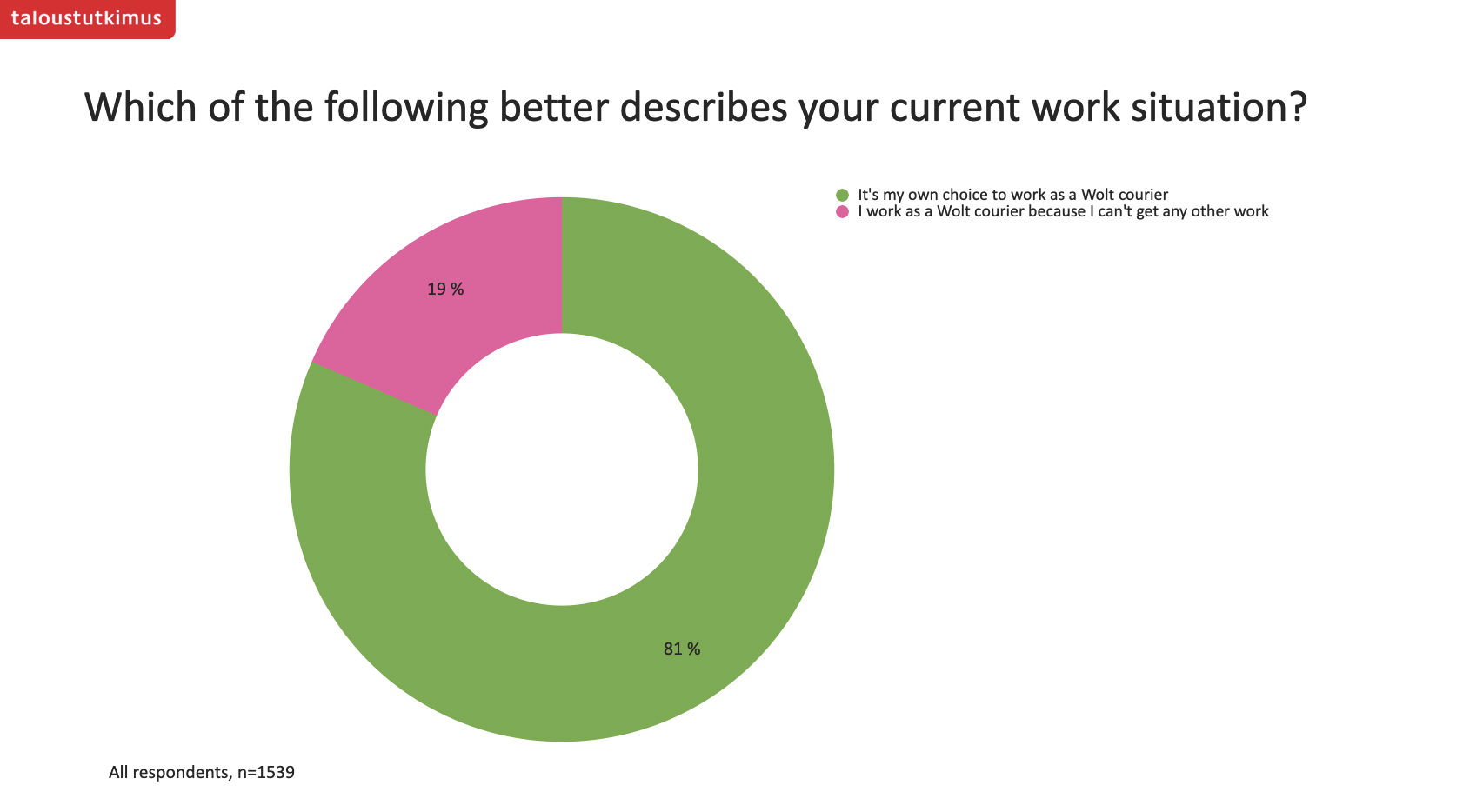
When they were asked where they get their income from, the answers looked like this:
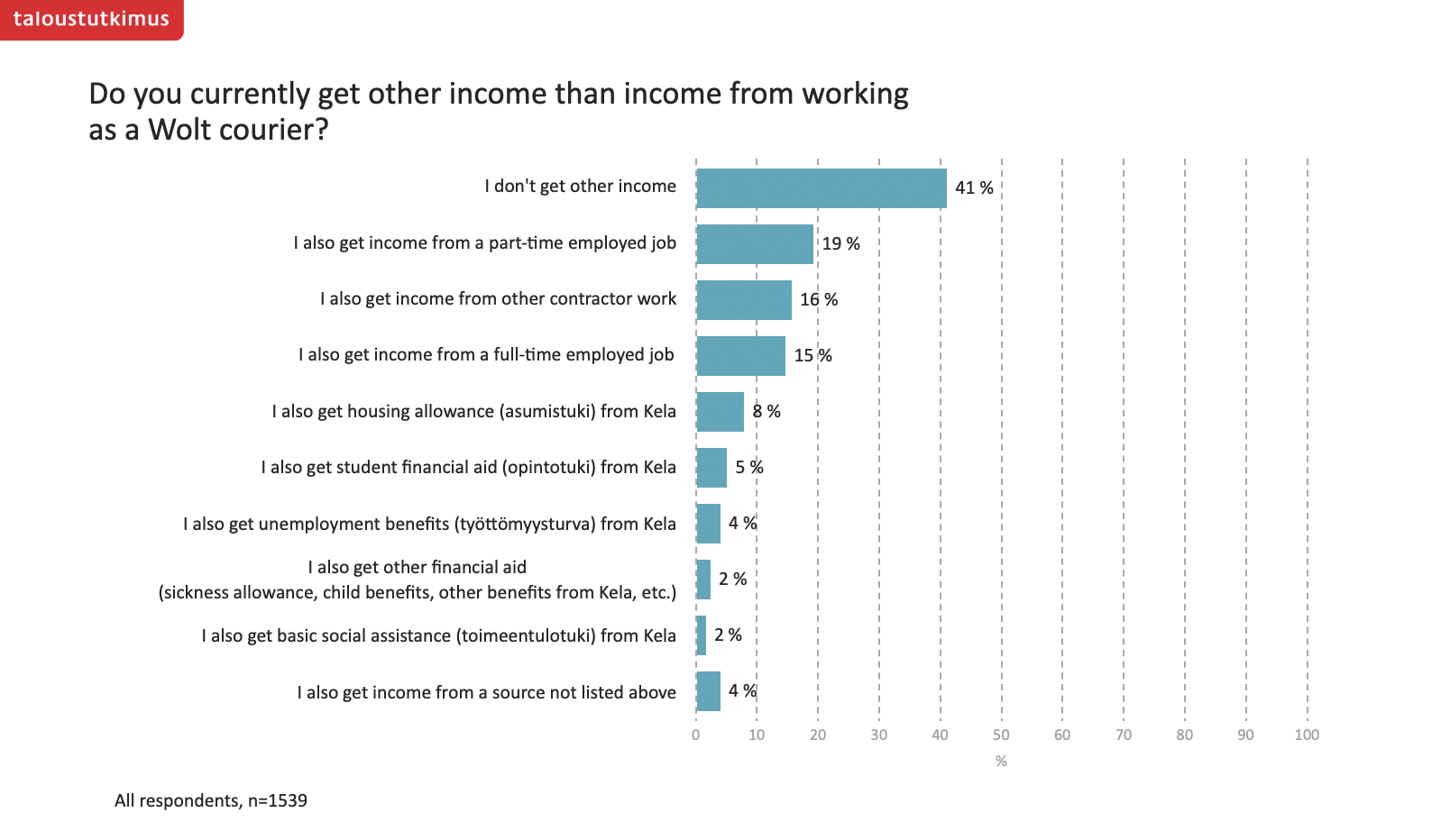
Couriers have advocated for being viewed as contractors also in the media
Couriers have expressed a clear wish to remain contractors in interviews and opinion pieces. Here are a few examples in Finnish:
- Turun Sanomat: Hyvä, paha Wolt (“The good, bad Wolt”). An op-ed from 12 couriers.
- Ilta-Sanomat: Nigerialainen Wolt-lähetti Echezona Madu, 28, jakaa ruokaa 10 tuntia päivässä – tällaista työ on ja näin paljon siitä maksetaan (Interview with a Helsinki-based courier Echezona Madu. In the interview, Madu says that he prefers freedom and that he knows what it’s like to be employed in Finland.)
- Helsingin Sanomat: Korona-arjen sankarit (“The heroes during corona”. Aayush Giri says that it depends on the person which model – being a contractor or employed – suits best. Giri says that they’d choose being a freelancer even though it has its downsides, such as not getting a holiday pay. )
- Yle: Ruokalähettien arvostus on kohentunut korona-aikana, vaikka työoikeudellisia ongelmia on yhä – Santosh Bagale: “Pidän työni joustavuudesta” (An interview with Santosh Bagale. Bagale says he likes the flexibility and if they were employed, they’d lose their current freedom and would have to follow the schedules the company sets.)

Wolt courier Simons Forsa picking up a delivery from La Torrefazione.
The Finnish Tax Office, and several other authorities: Couriers are contractors
Since the Labour Council’s statement, several authorities have concluded couriers to be contractors. This interpretation is shared at least by:
- The Finnish Tax Office with whom we discussed during May, and who see the work as contractor work, not employment. This decision has not been made public by Wolt previously.
- Insurance company Lähi-Tapiola and the Finnish Employment Accidents Compensation Board who gave their decision (“this is not employment”) this month (June 2021). This decision has also not been published previously.
- The National Enforcement Authority (“Ulosottolaitos”) and the Appeal Board for Unemployment Benefit (“työttömyysturvan muutoksenhakulautakunta”) which have given their opinion already in previous years. These decisions, that the couriers’ work is contractor work, have not been public previously either.
As for the Regional State Administrative Agency (AVI), we’re continuing our talks with them. The next step is to enter a hearing process which will take place in late Summer or early Fall. After the hearing, we will find out if the matter proceeds to administrative court, which will eventually decide if AVI’s possible recommendation to employ the couriers is correct, and legally-binding or not. This process is likely to take a few years.
What next? Renewing the current labour law or improving the safety nets of self-employed as alternative ways forward
We more than understand the societal debate regarding platform work and the well-being of platform workers. In Finland, being a self-employed contractor gives you a lot of freedom but means that you – first and foremost – are responsible for your own safety nets. As an employee, you have better safety nets automatically, but the work is carried out under the supervision of the employer and in a pre-set time window decided by the employer.
When we talk about our next steps, these points impact our thinking:
- The majority of the couriers very clearly prefer being a contractor, and are happy with the freedom and their income. They work as couriers because they have chosen it, are able to make a living and are well-educated on average. They don’t depend on social benefits any more than an average Finn.
- More and more authorities and other organizations seem to conclude Wolt couriers to be contractors.
- The more we have looked into the boundaries of the current laws, the more clear it has become that being a Wolt courier, with the freedom to choose when, where, and how much to work, would not be possible in an employment relationship. (This point alone could be turned into a blog post, but to mention one concrete example: even so-called 0-hour contracts won’t allow the couriers to choose how much they work at any given moment and decide their minimum and maximum hours.)
From our point of view, none of the points mentioned above support forcing a large number of people to employment against the majority’s will, effectively killing the new internet-enabled form of free work. Moreover, we can see that there’s demand for this kind of work: In Finland only, there are 15,544 people waiting to become couriers.
For these reasons, Wolt is very unlikely to follow the Regional State Administrative Agency’s possible recommendation to employ the couriers after the hearing procedure.
Instead, we believe that there are two better alternatives to improve the well-being of couriers: renewing the labour law so that it allows more freedom in an employment relationship than previously, or improving the safety nets of self-employed people.
In terms of improving the safety nets of the self-employed, we believe these concrete suggestions would go a long way:
- Let’s give Wolt and other platform companies the freedom to pay a certain percentage to a dedicated YEL fund on behalf of the couriers. YEL insurance is the most important insurance for a courier, as it enables pension and sickness allowance. Allowing companies like Wolt to adopt a more active role in correctly paying the insurance amounts would help in making sure that all the couriers are better insured.
- Let’s allow couriers to organize despite being self-employed. This would give a courier more negotiation power towards a platform. Fortunately, the EU is already working on a framework for this.
- Let’s make it possible for Wolt and other platforms to build safety nets for the couriers without the risk of being re-classified as an employer. (Currently, the free accident insurance we offer all couriers poses a legal risk as it can be used by people who oppose the contractor model to make Wolt look a bit more like an employer in the eyes of the law.)
- Let’s ensure couriers more legal certainty regarding their work. The current situation where authorities can conclude differently about couriers being employed or self-employed is not good. More concretely, it would be good to agree, for example, that if the person can freely choose their hours, reject tasks without penalties and work with several companies, the person should be seen as self-employed.
Thank you, and talk to you a bit later!
Thanks for making it this far, and we hope you’ve stayed healthy during this unordinary year. We wish everyone a happy and warm summer – we shall catch up later in the Fall.




